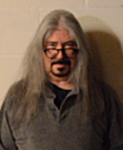The Powers of Ten.
Unless you are an elite electric guitar player, you may not be familiar with Shawn Lane, a virtuoso instrumentalist tragically taken before his career had a chance to take off. During the comet arc of his brief stage and studio career from roughly 1990-2000, during which time a teenage Mr. Lane played guitar tracks for Ringo Starr, Kris Kristofferson, Johnny Cash, Willie Nelson, Waylon Jennings, and Joe Walsh before joining Black Oak Arkansas as lead guitarist at age fourteen. In the four years that followed, Lane toured and opened shows for REO Speed Wagon, Ted Nugent, Cheap Trick, and Blue Öyster Cult. When you listen to Powers of Ten, you will hear his unmistakable influence on several of our modern masters. Virtuoso players like John McLaughlin, Eric Johnson, Jeff Beck, and Buckethead were all unabashed admirers. For his part, Mr. Lane admired the classical music he was exposed to as a child, and he was formally trained on the piano. Picking up the guitar at the age of twelve, he received critical reviews as a guitarist, but was unable to follow through on those successes as cascading health problems torpedoed his chances for commercial success. Afflicted with Cushing’s syndrome, Shawn used prescription pain killers to mitigate the unrelenting pain, but did not have medical insurance coverage. Without proper treatment, his symptoms and the side effects of the medications gradually spiraled out of control. Shawn Lane died in Memphis, Tennessee on September 26, 2003 from complications of his medical treatment.
Powers of Ten is a masterpiece for which Mr. Lane wrote all music; composed and arranged all strings and saxophones, as well as played all instruments. Two superb musicians appear on tracks 13 and 14 (Sean Rickman on drums and Barry Bays on bass). Mr. Lane’s incredible production sensibilities, including sound engineering by Andy Johns, are apparent throughout this delightfully upbeat, sometimes melancholy album. Search the internet for Shawn Lane, though, and you’ll find innumerable electric guitar references to “blazing fast shredding,” “fast and clean,” and even “fret-board pornography.” The emphasis on his lightning-fast technical abilities on the electric guitar represent a very narrow, very ignorant view of Mr. Lane’s importance as a multi-disciplined instrumentalist, composer, and producer. In fact, Lane never thought of himself as a guitar player, per se. His childhood training on classical piano and later formal study of music as a teenager are apparent on this album; his composition transforms simple, five note melody into a light-hearted Burt Bacharach “hook” he proceeds to transform into a Debussey-like confection. As the producer, Lane digitally isolated, scrubbed, honed, and polished each track into simple perfection …but, I’m getting ahead of myself. The most important thing to remember about Shawn Lane is that his music is about which notes he plays, not how fast he can play them.
Powers of Ten was released in 1992:
- “Not Again” 3:53
- “Illusions” 4:19
- “Get You Back” 4:57
- “West Side Boogie” 5:31
- “Powers of Ten Suite” 13:05
- “Concertino: Transformation of Themes” 9:07
- “Paris” 5:47
- “Esperanto” 3:39
- “Rules of the Game” 3:59
- “Gray Pianos Flying” 3:10
- “Epilogue (For Lisa)”
“Epilogue” is one of the most haunting melodies I’ve ever heard. It isn’t possible to write a melody like this without having known very great personal loss.
